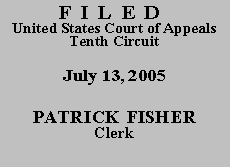

| VICKY L. GRISSOM,
Plaintiff-Appellant, v. JO ANNE B. BARNHART, Commissioner of the Social Security Administration, Defendant-Appellee. |
|
Vicky Grissom seeks review of the denial of supplemental security income benefits under Title XVI of the Social Security Act, see 42 U.S.C. § 1381a. After an administrative law judge (ALJ) denied her claim, both the Appeals Council and the district court affirmed the ALJ's decision. On appeal, Ms. Grissom raises the same issues she posed to the district court. She contends that the ALJ: (1) improperly evaluated the medical evidence and disregarded her treating and consultative physicians' opinions; (2) erred by failing to formulate a residual functioning capacity (RFC) that included all of her alleged limitations; and (3) erred by improperly disregarding certain testimony of the vocational expert. We have jurisdiction over this appeal under 42 U.S.C. § 405(g) and 28 U.S.C. § 1291, and we affirm.
In conducting our review of this case,
[w]e review the agency's decision to determine whether the factual findings are supported by substantial evidence in the record and whether the correct legal standards were applied. Substantial evidence is such relevant evidence as a reasonable mind might accept as adequate to support a conclusion. However, a decision is not based on substantial evidence if it is overwhelmed by other evidence in the record or if there is a mere scintilla of evidence supporting it. The agency's failure to apply correct legal standards, or show us it has done so, is also grounds for reversal. Finally, because our review is based on the record taken as a whole, we will meticulously examine the record in order to determine if the evidence supporting the agency's decision is substantial, taking into account whatever in the record fairly detracts from its weight. However, we may neither reweigh the evidence nor substitute our discretion for that of the Commissioner.
Hamlin v. Barnhart, 365 F.3d 1208, 1214 (10th Cir. 2004) (quotation marks, citations, and brackets omitted).
In a very thorough report, the magistrate judge assigned to this case carefully analyzed all of Ms. Grissom's contentions, and the district court adopted the magistrate judge's analysis and recommendations. We have reviewed the record and the ALJ's January 7, 2003, decision de novo, but we agree with the district court's analysis and legal conclusions. Specifically, we agree that (1) the ALJ properly weighed the opinions of the various consulting and treating physicians, and his reliance on Dr. Crittenden's findings was supported by substantial evidence; (2) the ALJ properly supported his decision to disregard Dr. Heller's report with specific, legitimate reasons; (3) the ALJ's determination that the medical record did not support a diagnosis of disabling osteoarthritis was supported by substantial evidence; and (4) the ALJ's RFC determination included all of the mental and physical impairments that he found were supported by the evidentiary record, thus he properly disregarded that part of the VE's testimony made in response to a hypothetical that included impairments not supported in the record. Accordingly, for substantially the same reasons set forth in the May 18,
2004, report and recommendations, we conclude that the ALJ's findings were
supported by substantial evidence and that he applied the correct legal standards.
The judgment of the district court is AFFIRMED.
Entered for the Court
Circuit Judge
*. This order and judgment is not binding precedent, except under the doctrines of law of the case, res judicata, and collateral estoppel. The court generally disfavors the citation of orders and judgments; nevertheless, an order and judgment may be cited under the terms and conditions of 10th Cir. R. 36.3.